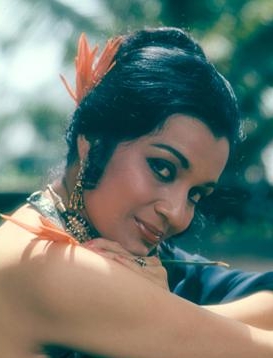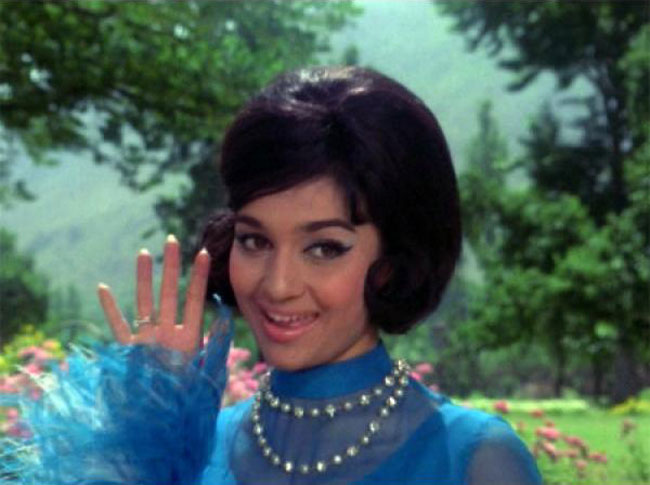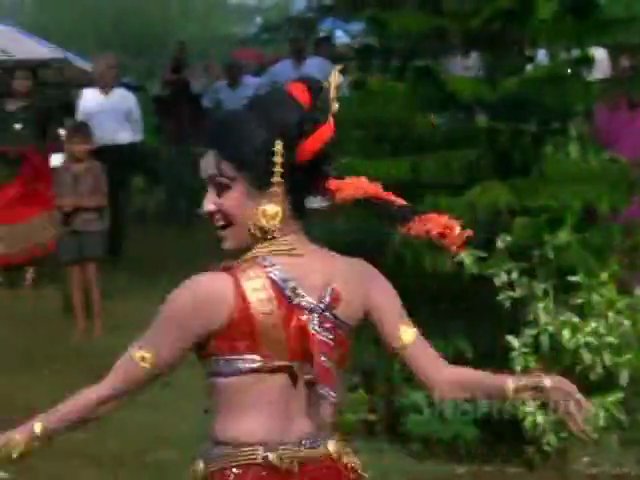Asha Parekh
This is a collection of newspaper articles selected for the excellence of their content. |
Nasir’s Eclectic Blog Tuesday, December 1, 2009
Contents |
Early life
Asha Parekh was born in 1942
Now, when Asha Parekh started out as Baby Parekh in Aasmaan (1952) which is only remembered for the full-fledged musical debut of the king of rhythm, O.P. Nayyar (after scoring background music in Kaneez 1949), Dilip Kumar had mesmerized the nation with his powerhouse of acting talent. Baby Parekh got a small role in Kishore Kumar-Usha Kiran starrer, Dhobi Doctor (1954). The same year, Asha Parekh was noticed by Bimal Roy who cast her in Baap Beti (1954) when she was twelve.
Asha Parekh was doing uncredited roles in some films, and Aasha (1957) was one of them. She continued her schooling and later joined the Filmalaya School of Acting. This school belonged to Sashadhar Mukherjee who was once a producer in the famous Bombay Talkies of Devika Rani and Himanshu Rai.
In 1943, he left the Bombay Talkies to form his own Filmistan Studio at Goregaon, Mumbai, in partnership with Rai Bahadur Chunilal, Gyan Mukherjee, and Ashok Kumar whose brother in law he was, having married the only sister of the last-named Super Star of that era. Nasir Hussain was one of the regular writers with Filmistan.
Sashadhar Mukherjee gave Nasir Hussain an opportunity to direct Filmistan’s Tumsa Nahin Dekha (1957), starring Shammi Kapoor and Ameeta. This movie proved to be a great hit, especially for the hero who tasted success after his nine films had flopped in a row. When Sashadhar broke away from Filmistan to set up his Filmalaya Studio at Amboli, Mumbai, he again asked Nasir Husain to direct a movie for him.
As a leading lady
This time it was Dil Deke Dekho (1959). In the meantime, Asha Parekh tried her luck for a heroine’s role in Vijay Bhatt’s Goonj UThi Shehnai (1959) but was rejected since according to the film-maker she was not a heroine material. That role went to Ameeta – also known as the Tumsa Nahin Dekha girl. The very next day, Sashadhar Mukherjee asked Nasir Husain to choose between Sadhna, and Asha Parekh, and Nasir Hussain chose the latter for the tomboyish role in Dil Deke Dekho. Thus she landed her first role as the leading lady opposite Shammi Kapoor.
Nasir Hussain’s choice of Asha Parekh as against Sadhna for the heroine’s role in Dil Deke Dekho set off a long term of relationship between them, on both professional as well as personal level. So when Nasir Hussain also turned producer by establishing his own production house under the banner of Nasir Hussain Films he never failed to take Asha Parekh as his leading heroine right from Jab Pyaar Kisise Hota Hai (1961) till Caravan (1971). His other films with Asha Parekh were Phir Wohi Dil Laya Hoon (1963), Teesri Manzil (directed by Vijay Anand, 1966), Baharon Ke Sapne (1967), and Pyar Ka Mausam (1969).
After 1971, he turned in favour of younger heroines such as Zeenat Aman, Kajal Kiran, Padmini Kolhapure, Dimple Kapadia and Jaya Pradha for his films. Nasir Hussain was already a married man with wife Ayesha, and a daughter Nuzhat and son Mansoor Khan who took over the reins of direction from Nasir Hussain for Qayamat Se Qayamat tak pairing the almost-debutantes, Amir Khan and Juhi Chawla.
Asha Parekh's roles
Most of her roles were glamourous ones, requiring her to look pretty and tomboyish, with little emotions and histrionics. Again, most of her heroes such as Joy Mukherjee (1961 - debut in Love in Simla), Biswajeet (hindi debut in Bees Saal Baad 1961), Jeetendra (debut in Geet Gaayaa Pathron Ne - 1963) and Rajesh Khanna (debut in 1967 in Raaz/Aakhri Khat) were junior to her. Even Dharmendra (debut in 1961: Dil Bhi Tera Ham Bhi Tere) and Shashi Kapoor (minus his roles as a child-artiste in Forties-Fifties; debut in Char Diwari in 1961) were her juniors acting-wise. The film directors other than Nasir Hussain who cast her in films were Shakti Samanta, Vijay Anand, Raj Khosla, Mohan Sehgal, Pramod Chakravothy, Raghunath Jhalani and J.P. Dutta.
Her role in Chiragh won her the nomination while that in Kati Patang won her the Filmfare Best Actress Award. Incidentally, in her interview with Jitesh Pillai, published in Film Fare magazine of September 2001 Mumtaz stated: "I should have won the Best Actress Award for Tere Mere Sapne. I really deserved it. Instead it went to Asha Parekh for Kati Patang in which she wore white and stood in front of piano doing precious little. Khair, jaane do (let it go). God has given me so much..." Earlier, the Kati Patang role had been offered to Sharmila Tagore who turned it down for "some silly reasons."
The other movies that won Asha Parekh the Filmfare nominations in the Best Supporting Actress category were Udhar ka Sindur (1976) and Main Tulsi Tere Angan ki (1978). She won the Filmfare Lifetime Award in 2002.
Asha Parekh’s career
Asha Parekh was the quintessential big-budget actress, because a very large percentage of her films were 'jubilee' hits, because of which she was also known as the Jubilee Girl.
Asha Parekh acted in some 85 Bollywood movies. It is from 1960 onwards that Asha Parekh began getting the lead roles in films such as Hum Hindustani and Ghunghat. Of course in Ghunghat she was totally eclipsed both in acting and beauty by her senior heroine, Bina Rai. Her most successful movies are the ones mentioned above. Her other hit films include Ziddi (1964), Mere Sanam (1965), Love in Tokyo (1966), Aaye Din Bahar Ke (1966), Shikar (1968), Kati Patang (1970), being the most prominent.
As a young heroine, her roles have mostly been glamorous except in a few movies such as Do Badan (1966), Kati Patang (1972), Chiragh (1969), Bahaaron Ke Sapne (1972) and Main Tulsi Tere Angan Ki (1978) where she has short role, which was in fact the last of her roles as the film heroine. Thereafter her roles were limited to that of a supporting actress and that chain continued till 1995 when Andolan was released.
She also became a Distributor with the release of Bahaaron Ke Sapne which had its premier at the Apsara Cinema in Mumbai but that film did not click as it was not in the league of the usual Nasir Hussain movies. She also continued with her classical dances and performed live on stage especially during 1972-73 when she went abroad. She also dabbled in TV show production line.
Personal life
Asha Parekh never married though according to her nothing is more therapeutic in life than companionship. She confides that men found her unapproachable. Even Shammi Kapoor who is her favourite and who played hero opposite her in four films, Dil Deke Dekho (1959), Teesri Manzil (1966), Pagla Kahin Ka (1969), and Jawan Mohabbat (1971) used to call her Bhatijee (“Niece”) while she addressed him as “Chacha” (i.e.Paternal Uncle).
She admitted that she had had a longtime boyfriend and it was good while it lasted. Dev Anand was the other senior actor who paired with her in Jab Pyar Kisise Hota Hai which did silver jubilee at the Alankar Cinema in Mumbai.
Asha Parekh doesn't like Dilip Kumar
Nasir’s Eclectic Blog continues: The views expressed are his
According to PTI reports, when Asha Parekh was asked why the audience did not see her and Dilip Kumar romancing on the screen, the former replied: “Who I don’t like, I don’t work with.” She was being felicitated by the IFFI at Panaji for her completion of 50 years in Bollywood.
The question is, whether any role was offered to her at all opposite Dilip Kumar. Or rather, did Dilip Kumar need an Asha Parekh.
To take the bull by the horns: What prompted Asha Parekh to make such a sweeping statement? Was it her comparative past youth? Was it her past beauty? Was it acting talent?
On seeking the answers to the above questions, we find that Dilip Kumar, even in his Fifties, has romanced a much younger and beautiful actress viz., Leena Chandavarkar when she played the role of heroine opposite Dilip Kumar in Bairaag (1976).
Again, his spouse Saira Banu was 2 years younger than Asha Parekh and 22 younger than Dilip Kumar at the time of her marriage in 1966. Then there’s the case of Rakhee who acted opposite Dilip Kumar as his wife in Shakti (1982). She is twenty-five years younger than Dilip Kumar and five years younger than Asha Parekh. Then we had the gorgeous Rekha acting opposite him in the shelved Aag Ka Darya (1982) and later in 1998 in Qila as his romantic interest where she is even “raped” by him. She is 32 years his junior. One can see some twelve-year old Rekha along with many other children, twisting away to the song and music of AAYEE HAIN BAHAAREN MITE ZULM-O-SITAM in Ram Aur Shyam. So what was it? Dilip Kumar has acted with beautiful actresses such as Madhubala and Saira Banu to name just a couple. Being an institution of acting unto himself, Dilip Kumar has acted with most powerful actresses such as Nargis, Meena Kumari, Nalini Jaywant, Vyjayantimala, Nimmi, Waheeda Rehman and Nutan. So we can conclude that there was no question of youth or beauty or acting talent involved in the reported statement of Asha Parekh that she doesn’t like Dilip Kumar.
Was it something personal then? Nasir Hussain had announced a movie, called Kala Aadmi which was to star Dilip Kumar. But this one did not see the light of the day and was shelved. This much we know. From this it appears that that this must have happened in the early Sixties. Likewise, maybe Asha Parekh was selected as the heroine as usual by Nasir Hussain. Maybe Dilip Kumar wanted Vyjayantimala as his heroine, since this was a hit pair of the late Nineteen Fifties and early Sixties. Sadly, there are no details. We can only conclude by quoting Congreve: "Heaven has no rage like love to hatred turned / Nor hell a fury like a woman scorned."
2015: Lobbying for Padma Bhushan
The Times of India Jan 04 2016
Nagpur
Union minister Nitin Gadkari has said that veteran Bollywood actress Asha Parekh had approched him seeking recommendation for Padma Bhushan award and that many others have been “chasing“ him. He said giving away Pad ma awards has become a “headache“ these days.
“Asha Parekh had come to me seeking recommendation for the Padma Bhushan award, saying that she was entitled to it,“ Gadkari said.
The minister said that he was being “chased“ for such recommendations. Gadkari claimed that Parekh had told him that she was entitled for the Padma Bhushan due to her massive contribution in Indian film industry .
Efforts to get Parekh's reaction did not fructify.
Filmography
As an actress
1952 Aasmaan (as Baby Asha Parekh)
1954 Baap Beti
1954 Dhobi Doctor
1954 Shri Chaitanya Mahaprabhu
1956 Ayodhyapati
1957 Aasha (uncredited)
1957 Ustad
1959 Dil Deke Dekho
1960 Ghunghat
1960 Hum Hindustani
1961 Chhaya
1961 Gharana
1961 Jab Pyar Kisise Hota Hai
1962 Apna Banake Dekho
1963 Akhand Saubhagyavati
1963 Bharosa
1963 Bin Badal Barsaat
1963 Meri Surat Teri Ankhen
1963 Phir Wohi Dil Laya Hoon
1964 Ziddi
1965 Mere Sanam
1966 Aaye Din Bahar Ke
1966 Do Badan
1966 Love in Tokyo
1966 Teesri Manzil
1967 Baharon Ke Sapne
1967 Upkar
1968 Kahin Aur Chal
1968 Kanyadaan
1968 Shikar
1969 Aya Sawan Jhoom Ke
1969 Chirag
1969 Mahal
1969 Pyar Ka Mausam
1969 Sajan
1970 Aan Milo Sajna
1970 Bhai-Bhai
1970 Kankan De Ohle
1970 Kati Patang
1970 Naya Raasta
1970 Pagla Kahin Ka
1971 Caravan
1971 Jawan Muhabat
1971 Jwala
1971 Mera Gaon Mera Desh
1971 Nadaan
1972 Rakhi Aur Hathkadi
1972 Samadhi
1973 Heera
1974 Anjaan Raahen
1975 Rani Aur Lalpari
1975 Zakhmee
1976 Lambhardarni
1976 Udhar Ka Sindur
1977 Adha Din Adhi Raat
1977 Kulvadhu
1978 Anpadh
1978 Main Tulsi Tere Aangan Ki
1979 Bin Phere Hum Tere
1979 Prem Vivah
1980 Badla Aur Balidan
1980 Gunehgaar
1980 Sau Din Saas Ke
1981 Aakhri Mujra
1981 Bulundi
1981 Kaalia
1981 Khel Muqaddar Ka
1982 Bura Aadmi
1984 Dharm Aur Qanoon
1984 Jeevan Sandhya
1984 Manzil Manzil
1984 Pakhandi
1985 Lava
1986 Car Thief
1986 Kismatwala
1986 Preeti
1987 Sachi Ibadat
1988 Hamara Khandaan
1988 Hum To Chale Pardes
1988 Main Tere Liye
1988 Prem Sandesh
1988 Sagar Sangam
1989 Batwara
1989 Do Yaar
1989 Hathyar
1989 Sharavegada Saradara
1990 Raeeszada
1991 Insaaf Ka Khoon
1993 Professor Ki Padosan
1994 Bhagyawan
1994 Ghar Ki Izzat
1995 Andolan
1996 Muthi Bhar Zameen
As a director
Dal Mein Kala Hai (television series)


